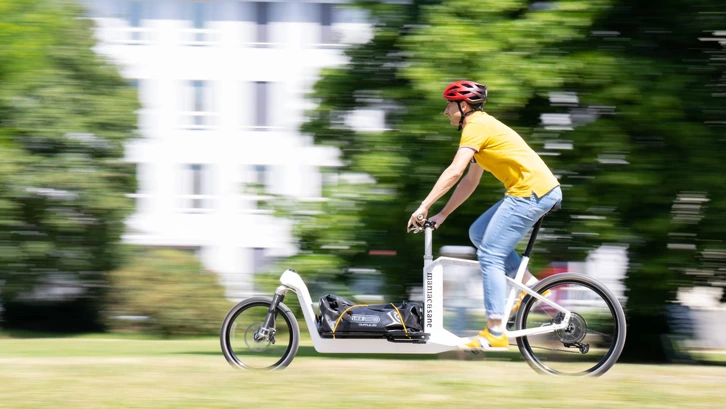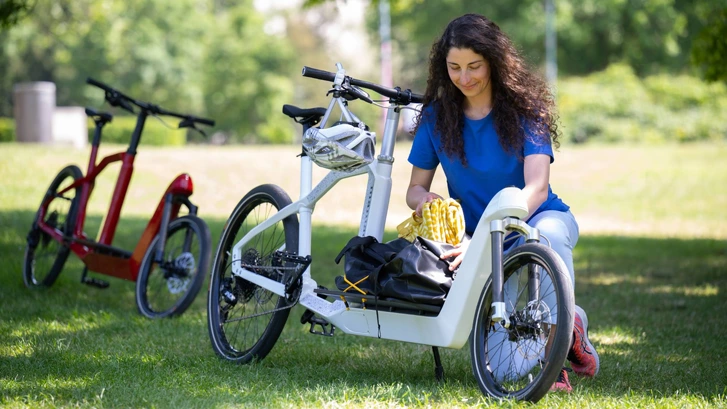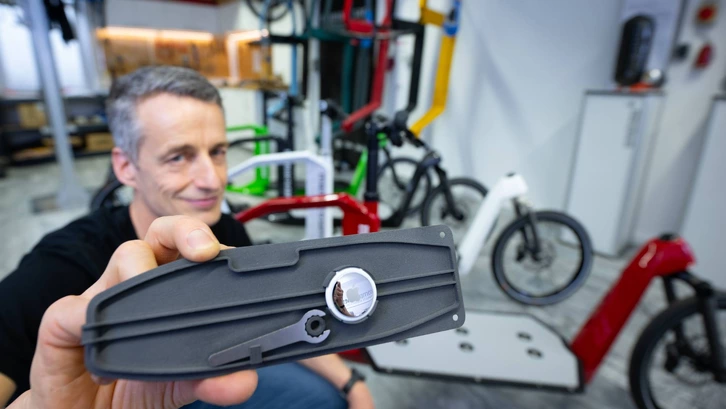Infinity meets reality
Polyamide 12 powders for 3D printed functional parts
How Evonik’s INFINAM®PA12 3D printing powder material supports integrity of functional parts for lightweight cargo bikes.
Use case at a glance

Whether it be a child, a dog or a crate of water, a cargo bike can transport it all. In fact, statistics show these are respectively also the most popular loads carried by cargo bike users. And it seems more and more people every day are transporting themselves, their pets or even goods with their own leg-pedaling power. Trends from the last three years continue to show upward growth in this direction. While there were 16,000 cargo bikes sold in Germany in 2019, the number skyrocketed to 100,000 two years later, as the economic effects of the pandemic subsided. And in Europe, cargo bike sales grew by an average of 40 percent between 2019 and 2021. Looking ahead, several market studies predict annual market growth for cargo bikes of more than 22 percent through 2030.
Meet Martin Fleischhauer. As a passionate "biker" and engineer for lightweight structures, he recognized this trend and founded the startup cargo-bike manufacturer, Maniac & Sane, based in Darmstadt, Germany.
"Though the urban environment is becoming increasingly dense and crowded, people want to live in it in a healthy and environmentally conscious way. Cargo bikes are the right solution for this area of tension, because they fit perfectly into everyday life. Along with saving time and the effort of searching for a parking space, using cargo bikes as transportation also provides us an entertaining form of exercise. It’s no wonder we're seeing more and more of them on our streets," explains Fleischhauer.
Despite being practical and chic, cargo bikes can be heavy – some with electric-assist can weigh up to 60 kilograms. And the greater the weight, the more effort needed to maneuver the vehicle through streets, intersections or past other road users. Fortunately, custom bicycle designers and tinkerers at Maniac & Sane are showing how things can be made easier, by creating ultralight cargo bikes made of fiber composite materials.
CHALLENGE: Lightweight and fully integrated functional parts
The challenge was to find the right technology and material for Maniac & Sane's cargo bike components. Considering the requirements: lightweight, functional components that were break-resistant and weather-resistant – and all that in a filigree design.
INFINAM® PA12 POWDERS FOR Design Freedom in 3D PRINTING
A high-performance thermoplastic, Evonik’s INFINAM® PA12 powder is specially designed to be used for additive manufacturing (3D printing) processes such as selective laser sintering (SLS), high-speed sintering (HSS), and multi-jet fusion (MJF). These polyamide-12 based powders have excellent material properties sought after by demanding end-users, including excellent powder flow, high impact strength, and great surface finish.
"Considering the requirements, the obvious choice was powder-based 3D printing and the INFINAM® PA12 material from Evonik," says Markus Albrecht, Additive Manufacturing Division Manager at Kegelmann Technik GmbH.
RESULT: Crazy-light cargo bikes with 3D parts onboard



To build these and other key functionalities into his cargo bikes, Fleischhauer turned to the unique advantages of additive manufacturing. And the Darmstadt-based engineer relied on the benefits of Evonik's INFINAM® PA12 high-performance plastic for 3D printing key lightweight, functional components.
Design freedom being one of the main attributes of additive manufacturing, the team at Maniac & Sane found 3D printing the ideal solution for integrating certain functions into their custom-designed cargo bike. Together with experts from Kegelmann Technik GmbH, a leader in the generative manufacturing of models, prototypes, tools and end products, the two companies created a lamp housing and an AirTag mount that featured as integral components of the cargo-bike’s frame structure.
With the help of SLS (selective laser sintering) technology, the folks at Maniac & Sane were able to develop functional parts and integrate them into the lightweight design concept of their cargo bikes. As such, the end product remained appealing in design and weight – and thus, appealing for the customer.
|
|
Listen to our exclusive podcast "Unbounding 3D printing at scale" by subscribing to our newsletter.
